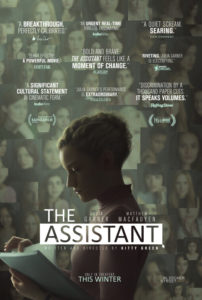Sundance 2020 Review: “The Assistant” Explores the Crushing Power of Abuse
Written by: Christopher Llewellyn Reed | February 6th, 2020

The Assistant (Kitty Green, 2019) 3 out of 4 stars.
A bleak film about an even bleaker subject (released, in a bit of homonymous coincidence, by Bleecker Street Media, no less), Kitty Green’s The Assistant features Julia Garner (Ruth Langmore on Netflix’s Ozark) as a hapless cog in a very sharp wheel, spinning in all directions but forwards as she tries to navigate a seemingly impossible situation. Taking as a departure point the many allegations against now-disgraced movie mogul Harvey Weinstein, the film plunges the viewer into an atmosphere of deep dread, with all parties involved in, and complicit with, the worst kind of harassment and abuse. Where money and power collide with desperation, all things are permitted. What can one do to keep one’s head up and live to work another day?
When first we meet Garner’s Jane, it is in the dark of night, which turns out to be early morning. A car service picks her up in Queens and brings her to Manhattan, where she slowly opens a large, nondescript office complex, turning lights and machines on, grabbing a small bite of food as she goes, though the hangnail on which she obsessively chews is more accessible. Soon, others arrive, and we eventually find her at a desk, next to two slightly more senior male colleagues. From that perspective, we will watch her throughout the day as she arranges travel and … other things … for her off-screen, entitled tyrant of a boss. Though we never see him, we hear him, whether through doors or on the phone, his low purr of an alternately threatening and cajoling growl enough to send Jane into a frozen panic. Life is good, is it not?

This being a riff on Weinstein, it’s a film-production office, with scripts, executives and, most importantly, actresses rotating through doors in the hopes of getting something from the big man in exchange for the insults and degradations they endure. The stakes are both high (a shot at the big time!) and ridiculously low (perhaps I’ll hear a nice word), and the master narcissist at the center of the dysfunctional maelstrom is firmly in control of everyone’s moods.
Until, that is, Jane decides that enough is enough, which finally happens when a new assistant is hired, whose inexperience and wholesome, innocent beauty immediately set off warning bells. By this time, we know that Jane knows more than she admits about the secret goings-on of her boss, but it has so far seemed as if she, like everyone else, accepts the reality that exists. But there’s a light inside her that has yet to be extinguished, so she heads to HR, where a Mr. Wilcock (Matthew Macfadyen, Lost in Karastan) sits down to discuss her fears. Very quickly, in a scene both haunting and, unfortunately, a tad obvious (since it tells us exactly what the movie is about, whereas heretofore we have dealt with nuance and complexity), we realize that Wilcock is most definitely not on her side. Jane is on her own, as are, the film posits, all women and all the powerless within (male-dominated) hierarchies.

Garner is fully engaged and fully engaging, her face, often shot in close-up, a marvel of warring emotions, barely expressed. Director Green (Casting JonBenet) favors long takes, leaving her actress to work through whatever roils within. It’s a highly effective technique to express the loneliness of her position (more so than in the scene with Macfadyen), wordlessly highlighting the perceived hopelessness of working for a monster. It’s in such moments that The Assistant shines, silently condemning the cruelty to which we give a pass, in the belief that our turn in the sun may come if we just keep our mouths shut. Even when it strays from this cinematic perfection, the memory of it remains, carrying the film through to its very bitter end.

